初中英语语法知识—介词的知识点总复习
初中英语介词知识点:常用介词要点

初中英语介词知识点:常用介词要点在英语中,介词虽然是一种小词,但在作用和运用上的复杂性却不可小看。
首先,可以毫不夸张地说,离开了介词的中介或连接作用,就无法表达某些最基本的思想或概念。
下面是小编为您收集整理的初中英语介词知识点:常用介词要点,供大家参考!初中英语介词知识点:常用介词要点1、this / that / these / those / last / next / a / every / each等词构成的时间短语,前面不用任何介词。
如:Every year travellers from abroad come to visit Pingyao.(每年都有国外的游客来游览平窑镇)/ He had a bad cold that week.(那个星期他患重感冒)2、for有时用来引出动词不定式的逻辑主语,常翻译成“对于…而言”。
如:It's too hard for me to finish the work in only one hour.(让我在区区一个小时内完成这项工作太难了)/ The house is big enough for 10 men to live in.(房子够大的可以容10个人住)3、of有时用来表示后面的人物正好是前面的表语的逻辑主语。
如:It's very nice/kind of you to do so.(你这么做真是太好了)4、介词有时会与它的宾语分离,而且宾语前置。
①当宾语是疑问词时。
Who are you talking about?(你们在谈论谁?)②宾语在从句中当连接词时。
He has a younger brother who he must take good care of.(他有一个需要他照顾的小弟。
) / Do you know who our teacher is talking with over there?(你知道我们的老师在那边和什么人谈话吗?)动词不定式作定语且该动词为不及物动词,后面有介词。
初中英语知识点归纳介词的用法
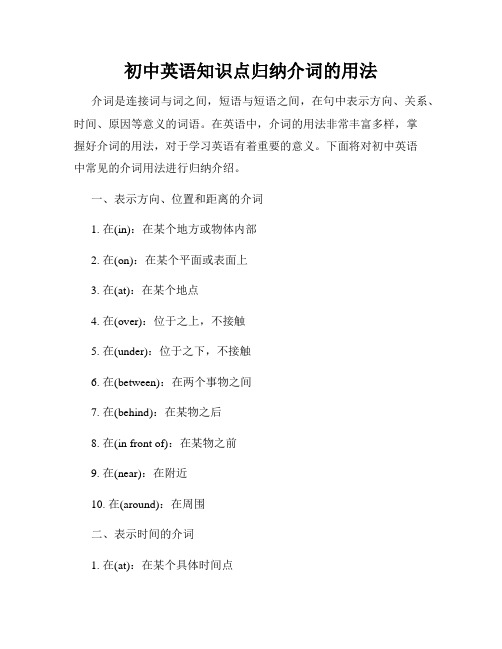
初中英语知识点归纳介词的用法介词是连接词与词之间,短语与短语之间,在句中表示方向、关系、时间、原因等意义的词语。
在英语中,介词的用法非常丰富多样,掌握好介词的用法,对于学习英语有着重要的意义。
下面将对初中英语中常见的介词用法进行归纳介绍。
一、表示方向、位置和距离的介词1. 在(in):在某个地方或物体内部2. 在(on):在某个平面或表面上3. 在(at):在某个地点4. 在(over):位于之上,不接触5. 在(under):位于之下,不接触6. 在(between):在两个事物之间7. 在(behind):在某物之后8. 在(in front of):在某物之前9. 在(near):在附近10. 在(around):在周围二、表示时间的介词1. 在(at):在某个具体时间点2. 在(in):在某个时间段3. 在(on):在某个具体日期三、表示原因的介词1. 因为(of):表示原因、缘故2. 由于(because of):表示原因、由于四、表示目的、用途和方式的介词1. 为了(in order to):表示目的2. 以便(in order that):表示目的3. 用(with):表示使用的手段或工具4. 通过(by):表示方式、方法5. 以(for):表示目的五、表示比较的介词1. 比较起见(than):表示比较的对象2. 和(with):与某人或某物在一起六、其它常见的介词1. 关于(about):表示涉及某一话题2. 靠(by):表示接近某人或某物3. 经过(through):表示通过某地或某事4. 编写(at):表示在某地工作或活动5. 因(as):表示角色、身份6. 例如(for example):表示举例7. 包括(including):表示包含某物以上是初中英语中常见的介词用法的归纳总结。
熟练掌握这些介词的用法,对于构建正确的句子和语法结构非常重要。
希望能对你的学习有所帮助。
初中英语语法介词知识点总结.

初中英语语法介词知识点归纳1.in; on; at 用在时间词前 ,表“在”1at + 具体时刻2on + 具体某天 (具体某天的上、下午等 ;星期词 ;以及上、下午词前有修饰词时3in + 年、月、季节及一天中的某部分但注意 :at night= in the night at noonat this / that time at Christmaseg. 1.___ the morning 2.___ Monday morning3.___ a rainy evening4.___3:505.__ 20026.___ the morning of April 107.___ spring8.___ night 9.___ this time 10. ___ March另外注意 :在时间词 (morning , afternoon , evening ; Sunday 前有 last, next , this , that 时,不再用介词 . tomorrow, tonight 前也不用介词。
eg. I will go(A to the cinema(B in(C this evening.2. in , on , at 表地点 :at 一般指小地方 ;in 一般指大地方或某个范围之内 ;on 往往表示“在某个物体的表面”。
例如 :eg. 1He arrived ___Shanghai yesterday.2They arrived ___a small village before dark.3There is a big hole ____ the wall.4The teacher put up a picture ____ the wall.3.in , on , to 表方位in(范围内 ;on(范围外且接壤 ;to(范围外但不接壤。
可表示为下图的位置关系eg.1Taiwan is in the southeast of China.2Hubei is on the north of Hunan.3Japan is to the east of China.cross: 动词“跨过 ,越过” =go across4. across: (表面跨过through: (内部穿过 ,贯穿介词eg. 1Can you swim _____ the river?2The road runs __________ the forest.3 _____ the bridge, you’ ll find a cinema.5.in + 时间段 :与将来时连用after + 时间段 :与过去时连用但 after + 时间点 :可与将来时连用。
初中英语语法专题讲座12——介词

这三个介词都可以表示地点,意思是“在……上”,但具体含义有所不同。
⑴on是指与物体表面接触而不是在其上方。例如:They are sittingonthe grass.他们坐在草地上。Do you liveonthe second floor?[美国英语]你住在二楼吗?/[英国英语]你住在三楼吗?He jumpedonthe horse.他跳上了马。
⑵介词短语用作宾语补足语,例如:I was surprised to find himon the bus.发现他在公共汽车上,我很吃惊。Please make yourselfat home.请随便一点,不要拘束。
⑶介词短语用作后置定语,例如:The girlin the hatis my sister.那个头戴帽子的女孩是我的妹妹。Do you like the jacketon the left?你喜欢左边的那件短上衣吗?Did you see the housewith many trees around it?你看到那座周围长满树的房子了吗?
7.instead, instead of:
⑴instead不是介词,而是副词。它的意思是“作为代替;(不……)而”,中文译法灵活。instead常位于句末。例如:He was ill, so I wentinstead.他病了,因此我就(代他)去了。I don’t like this one; please give me thatinstead.我不喜欢这一个,请把那一个给我。They don’t have beef; let’s have some fishinstead.他们没有牛肉,我们改吃鱼吧。
2.during, in:
两者用作介词时均与表示一般时间的名词连用,意为“在…期间”,一般情况下能相互换用。但是,在实际运用中应注意下面几点:
中考英语介词知识点精讲大全
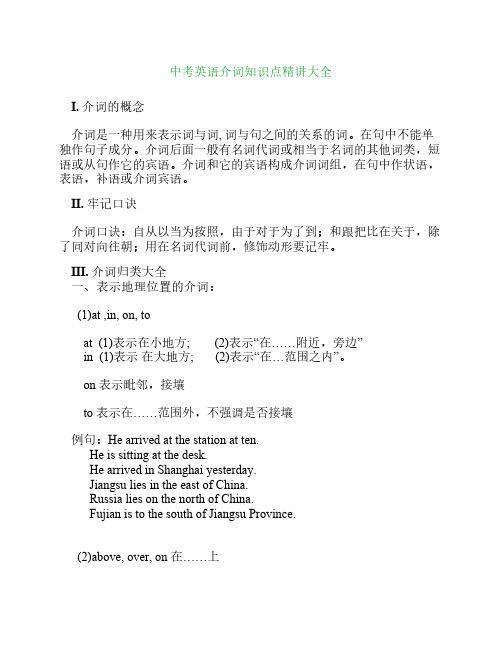
中考英语介词知识点精讲大全I. 介词的概念介词是一种用来表示词与词, 词与句之间的关系的词。
在句中不能单独作句子成分。
介词后面一般有名词代词或相当于名词的其他词类,短语或从句作它的宾语。
介词和它的宾语构成介词词组,在句中作状语,表语,补语或介词宾语。
II. 牢记口诀介词口诀:自从以当为按照,由于对于为了到;和跟把比在关于,除了同对向往朝;用在名词代词前,修饰动形要记牢。
III. 介词归类大全一、表示地理位置的介词:(1)at ,in, on, toat (1)表示在小地方; (2)表示“在……附近,旁边”in (1)表示在大地方; (2)表示“在…范围之内”。
on 表示毗邻,接壤to 表示在……范围外,不强调是否接壤例句:He arrived at the station at ten.He is sitting at the desk.He arrived in Shanghai yesterday.Jiangsu lies in the east of China.Russia lies on the north of China.Fujian is to the south of Jiangsu Province.(2)above, over, on 在……上above 指在……上方,不强调是否垂直,与 below相对;over指垂直的上方,与under相对,但over与物体有一定的空间,不直接接触。
on表示某物体上面并与之接触。
例句:The bird is flying above my head.There is a bridge over the river.He put his watch on the desk.(3)below, under 在……下面under表示在…正下方below表示在……下,不一定在正下方例句 There is a cat under the table.Please write your name below the line.二、表示时间的介词:(1)in , on,at 在……时in表示较长时间,如世纪、朝代、时代、年、季节、月及一般(非特指)的早、中、晚等。
初中介词的用法归纳

初中介词的用法归纳一、关键信息项1、介词的定义及分类2、常见介词的用法及示例3、介词与动词、形容词的搭配4、介词短语在句中的作用5、易混淆介词的辨析6、中考中对介词的考查重点及题型11 介词的定义介词是一种虚词,用来表示名词、代词等与句中其他词的关系,在句中不能单独作句子成分。
111 介词的分类1、时间介词,如 at、in、on 等。
2、地点介词,如 at、in、on、under、behind 等。
3、方式介词,如 by、with、in 等。
4、其他介词,如 for、of、to 等。
12 常见介词的用法及示例121 at 的用法1、表示在具体的时刻,如 at six o'clock。
2、表示在较小的地点,如 at the bus stop。
122 in 的用法1、表示在较长的时间段,如 in the morning。
2、表示在较大的地点,如 in Beijing。
123 on 的用法1、表示在具体的某一天,如 on Monday。
2、表示在物体的表面,如 on the table。
13 介词与动词、形容词的搭配131 与动词的搭配例如,look at(看)、listen to(听)、arrive in/at(到达)等。
132 与形容词的搭配例如,be interested in(对感兴趣)、be good at(擅长)等。
14 介词短语在句中的作用141 作定语如,The girl in red is my sister (in red 作定语修饰 girl)142 作状语如,He studies hard at night (at night 作状语)143 作表语如,He is in the classroom (in the classroom 作表语)15 易混淆介词的辨析151 in 和 onin 表示在里面,on 表示在上面。
152 at 和 inat 表示在较小的地点,in 表示在较大的地点。
初中英语语法基础知识汇总介词
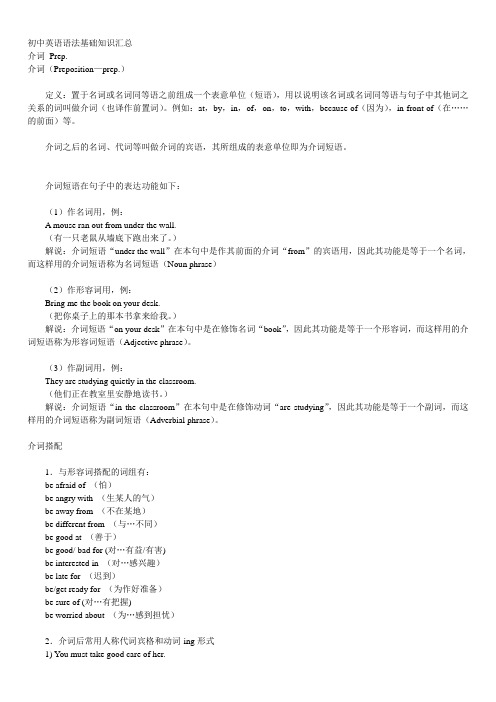
初中英语语法基础知识汇总介词Prep.介词(Preposition—prep.)定义:置于名词或名词同等语之前组成一个表意单位(短语),用以说明该名词或名词同等语与句子中其他词之关系的词叫做介词(也译作前置词)。
例如:at,by,in,of,on,to,with,because of(因为),in front of(在……的前面)等。
介词之后的名词、代词等叫做介词的宾语,其所组成的表意单位即为介词短语。
介词短语在句子中的表达功能如下:(1)作名词用,例:A mouse ran out from under the wall.(有一只老鼠从墙底下跑出来了。
)解说:介词短语“under the wall”在本句中是作其前面的介词“from”的宾语用,因此其功能是等于一个名词,而这样用的介词短语称为名词短语(Noun phrase)(2)作形容词用,例:Bring me the book on your desk.(把你桌子上的那本书拿来给我。
)解说:介词短语“on your desk”在本句中是在修饰名词“book”,因此其功能是等于一个形容词,而这样用的介词短语称为形容词短语(Adjective phrase)。
(3)作副词用,例:They are studying quietly in the classroom.(他们正在教室里安静地读书。
)解说:介词短语“in the classroom”在本句中是在修饰动词“are studying”,因此其功能是等于一个副词,而这样用的介词短语称为副词短语(Adverbial phrase)。
介词搭配1.与形容词搭配的词组有:be afraid of (怕)be angry with (生某人的气)be away from (不在某地)be different from (与…不同)be good at (善于)be good/ bad for (对…有益/有害)be interested in (对…感兴趣)be late for (迟到)be/get ready for (为作好准备)be sure of (对…有把握)be worried about (为…感到担忧)2.介词后常用人称代词宾格和动词-ing形式1) You must take good care of her.2) Thank you for teaching us so well.3.几组易混淆的介词A.“在...之后”in + 一段时间(用于一般将来时)after + 一段时间(用于一般过去时)after + 一点时间(常用于一般将来时)如:The baby stopped crying after half an hour.The baby will stop crying in half an hour.They will visit their teacher after Friday.B.for +一段时间since +过去的一点时间这两者均用于现在完成时,具体在时态部分,我会继续向同学们讲解。
人教版中考英语复习专题介词知识点总结
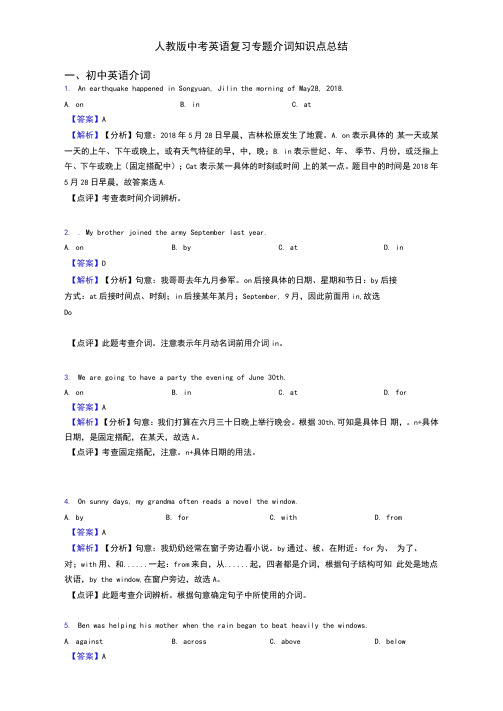
人教版中考英语复习专题介词知识点总结一、初中英语介词1.An earthquake happened in Songyuan, Jilin the morning of May28, 2018.A. onB. inC. at【答案】A【解析】【分析】句意:2018年5月28日早晨,吉林松原发生了地震。
A. on表示具体的某一天或某一天的上午、下午或晚上,或有天气特征的早,中,晚;B. in表示世纪、年、季节、月份,或泛指上午、下午或晚上(固定搭配中);Cat表示某一具体的时刻或时间上的某一点。
题目中的时间是2018年5月28日早晨,故答案选A.【点评】考查表时间介词辨析。
2.. My brother joined the army September last year.A. onB. byC. atD. in【答案】D【解析】【分析】句意:我哥哥去年九月参军。
on后接具体的日期、星期和节日:by后接方式:at后接时间点、时刻;in后接某年某月;September, 9月,因此前面用in,故选Do【点评】此题考查介词。
注意表示年月动名词前用介词in。
3.We are going to have a party the evening of June 30th.A. onB. inC. atD. for【答案】A【解析】【分析】句意:我们打算在六月三十日晚上举行晚会。
根据30th,可知是具体日期,。
n+具体日期,是固定搭配,在某天,故选A。
【点评】考查固定搭配,注意。
n+具体日期的用法。
4.On sunny days, my grandma often reads a novel the window.A. byB. forC. withD. from【答案】A【解析】【分析】句意:我奶奶经常在窗子旁边看小说。
by通过、被、在附近:for为、为了、对;with用、和......一起:from来自,从......起,四者都是介词,根据句子结构可知此处是地点状语,by the window,在窗户旁边,故选A。
初中英语介词知识点归纳

初中英语介词知识点归纳介词是英语中非常重要的一部分,它用来建立词与词、句与句之间的关系,能够使句子结构更加完整且信息更加准确。
在初中英语学习中,了解和掌握介词的用法和常见的搭配是非常重要的。
下面就来归纳一些初中英语中常见的介词知识点。
1. 表示地点的介词常见的表示地点的介词有:at, in, on, under, above, below, near, beside等。
例如:- I live in a big city.- The book is on the table.- The cat is under the chair.- The bird is flying above the tree.- She is standing beside her friend.2. 表示时间的介词常见的表示时间的介词有:at, in, on, before, after, during, for等。
例如:- I go to school at 7 o'clock.- We have a holiday in summer.- She always listens to music before going to bed.- They play soccer after school.- We studied for two hours.3. 表示原因的介词常见的表示原因的介词有:because of, due to, thanks to等。
例如:- He couldn't come because of the bad weather.- The match was canceled due to the heavy rain.- Thanks to your help, I finished my homework.4. 表示目的的介词常见的表示目的的介词有:for, to等。
例如:- He bought a gift for his mother.- She went to the supermarket to buy some food.5. 表示方式的介词常见的表示方式的介词有:by, with等。
初中英语语法复习:介词(中考总复习)

over
经过、跨越。
我们必须越过那座山。
专题五 介 词
返回目录
介词
含义及用法
例句
方
After you go through the gate, you’ll
位
意为“穿过;通过;经过”,
through
see a beautiful garden. 穿过门之后,
指从空间内部通过。
介
你将看到一个美丽的花园。
升
-He came_______Monday.
A.in
B.on
C.to
D.by
专题五 介 词
8.-Please tell me your decision_______tomorrow morning, OK?
拓
-No problem.I will call you tonight.
展
A.before B.during C.through D.since
(台湾是中国的一部分)
专题五 介 词
返回目录
介词
含义及用法
举例
表示“在……(的平面)上”。 on the desk在桌上
(即: )
on the wall在墙上
方
on 表示A地位于B地的外面且接壤 Hunan Province lies on the west of
。 位
(即: )
Jiangxi Province.湖南省在江西省西 边。(湖南省同江西省接壤)
by
the kids playing outside.简站在窗户
位
靠近
旁边,看着外面玩耍的孩子们。
介
There is a football behind the table.
介词的知识点总结
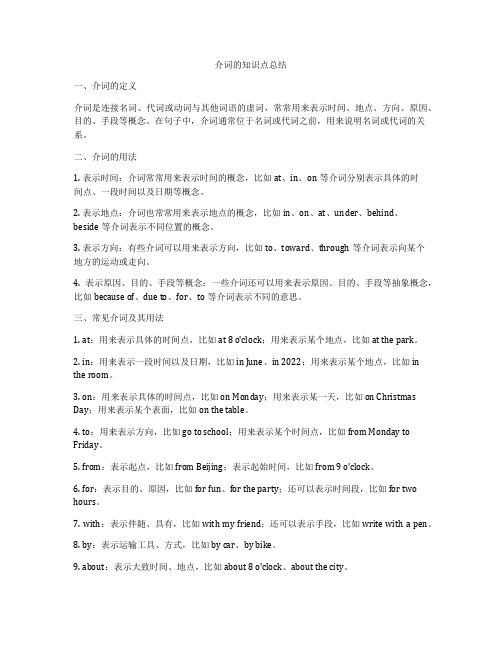
介词的知识点总结一、介词的定义介词是连接名词、代词或动词与其他词语的虚词,常常用来表示时间、地点、方向、原因、目的、手段等概念。
在句子中,介词通常位于名词或代词之前,用来说明名词或代词的关系。
二、介词的用法1. 表示时间:介词常常用来表示时间的概念,比如at、in、on等介词分别表示具体的时间点、一段时间以及日期等概念。
2. 表示地点:介词也常常用来表示地点的概念,比如in、on、at、under、behind、beside等介词表示不同位置的概念。
3. 表示方向:有些介词可以用来表示方向,比如to、toward、through等介词表示向某个地方的运动或走向。
4. 表示原因、目的、手段等概念:一些介词还可以用来表示原因、目的、手段等抽象概念,比如because of、due to、for、to等介词表示不同的意思。
三、常见介词及其用法1. at:用来表示具体的时间点,比如at 8 o'clock;用来表示某个地点,比如at the park。
2. in:用来表示一段时间以及日期,比如in June、in 2022;用来表示某个地点,比如in the room。
3. on:用来表示具体的时间点,比如on Monday;用来表示某一天,比如on Christmas Day;用来表示某个表面,比如on the table。
4. to:用来表示方向,比如go to school;用来表示某个时间点,比如from Monday to Friday。
5. from:表示起点,比如from Beijing;表示起始时间,比如from 9 o'clock。
6. for:表示目的、原因,比如for fun、for the party;还可以表示时间段,比如for two hours。
7. with:表示伴随、具有,比如with my friend;还可以表示手段,比如write with a pen。
初中英语介词语法知识点总结(讲义及答案)
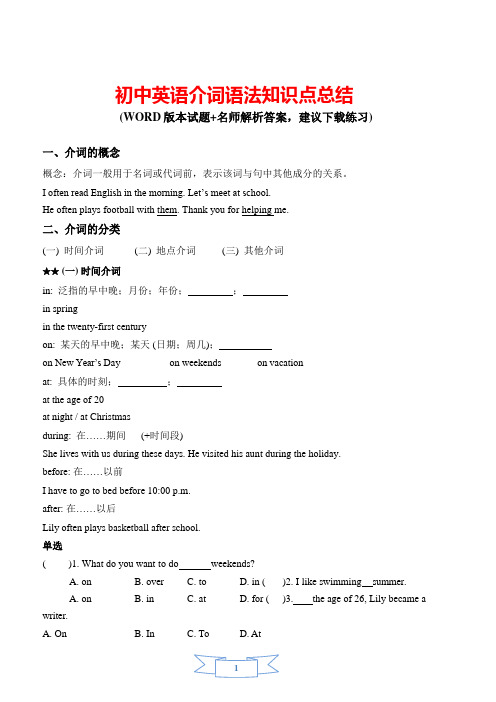
初中英语介词语法知识点总结(WORD版本试题+名师解析答案,建议下载练习)一、介词的概念概念:介词一般用于名词或代词前,表示该词与句中其他成分的关系。
I often read English in the morning. Let’s meet at school.He often plays football with them. Thank you for helping me.二、介词的分类(一) 时间介词(二) 地点介词(三) 其他介词★★ (一) 时间介词in: 泛指的早中晚;月份;年份;;in springin the twenty-first centuryon: 某天的早中晚;某天 (日期;周几);on New Year’s Day on weekends on vacationat: 具体的时刻;;at the age of 20at night / at Christmasduring: 在……期间(+时间段)She lives with us during these days. He visited his aunt during the holiday.before: 在……以前I have to go to bed before 10:00 p.m.after: 在……以后Lily often plays basketball after school.单选( )1. What do you want to do weekends?A. onB. overC. toD. in ( )2. I like swimming summer.A. onB. inC. atD. for ( )3. the age of 26, Lily became a writer.A. OnB. InC. ToD. At( )4. Jim learned to drive ___ the holiday.A. atB. duringC. toD. for( )5. He went to Shanghai July 7, 2013 and came backa cold morning last year.A. in; onB. on; inC. on; onD. in; in( )6. My mom often tells me to go back home dark(黄昏).A. afterB. toC. beforeD. for( )7. A lot of people are here _ vacation every year.A. ofB. onC. atD. with★★ (二) 地点介词1.地点介词 at, in, onat: “在……”(表一个点或小地方)at home at Mr. Cool’s Clothes Storeat the pool at Central Parkin: “在……里” (表一个范围或大地方) in China in Beijing in the water in the parkon: “在……上” (表一个表面,并接触) on the floor on the wall 对比这三个句子:They stood at the door and waited.他们站在门口等着。
中考语法专题复习介词及介词短语

中考语法复习一一介词及介词短语【考点直击】1.常用介词及其词组的主要用法及意义2.介词表示时间、方位、方式别的基本用法3.一些易混介词的辨析【语法讲解】♦介词的功能介词是一种虚词,用来表示名词或相当于名词的其它词语句中其它词的关系,不能单独使用。
介词可与名词或相当于名词的其它词构成介词短语。
介词短语可在句中作定语,状语,表语和宾语补足语。
例如:The boy over there is John’s 定语her.(The girl will be back in two hW®Our English teacher is from Aust表aD)a.(Help yourself to some fi 宾语补足语)♦介词和种类(1)简单介词,常用的有 at, in, on, about, across, before, beside, fo等o, to, without(2)复合介词,如 by means of, along with, because of, in front。
等。
instead of♦不同介词的用法(1)表时间的介词1)at, in on表示时间点用21。
例如:at six o’clock, at noon, at。
m表示在某个世纪,某年,某月,某个季节以及早晨,上午,下午,晚上时,用皿例如:in the nineteenth century, in 2002, in may, in winter, in the morning, in the等0t表n示具体的某一天和某一天的上午,下午,晚上时,用。
&例如:on Monday, on July 1st, on Sunday meaning2)since, after由since和after引导的词组都可表示从过去某一点开始的时段,但sinc前组表示的时段一直延续到说话的时刻,因而往往要与现在完成时连用。
而afte词组所表示的时段纯系过去,因而要与一般过去时连用。
初中英语语法知识—介词的知识点复习

一、选择题1.–Emma can go out ________ school nights but she must be back ________ ten o’clock.--Oh, I see.A.on, before B.on, after C.in, before D.in, after2.North Korea is________Asia. It’s________the northeast of China and________the west of Japan.A.in, to, on B.in, on, to C.on, in, to D.to, on, in3.— Are you going to school________bus?—No, we are going________Mary’s mother’s car.A.by, by B.from, by C.by, in D.in, at4.The girl often goes to the park many beautiful flowers.A.with B.have C.has D.in5.—What do you think of happiness, Zoe?—I think happiness is a way station too much and too little.A.among B.between C.opposite D.beyond6.--There are many theatres _________the island.--Yes, Broadway is the southern end of the island..A.at; at B.on; on C.at; on D.on; at7.---Would you like some coffee?--Yes, and please get me some milk. I prefer coffee _________ milk.A.on B.to C.for D.with8.She is talented ________ music but I am good at sports.A.at B.in C.on9.The Qingming Festival of this year falls _____ April 5th and thousands of cars poured into high-ways _____ the early morning of the holiday.A.on; in B.in; on C.on; on D.in; in10.Look! The girl ________ green clothes is my sister and the boy ________ big eyes is my brother.A.in; has B.in a; has a C.in; with D.in a; with a 11.Jim and Tim are talking _______ the phone.A.at B.on C.with D.in12.—There is a hole in the wall. What is it for?—We have a dog. He can get in or out ________ it.A.past B.through C.across D.over 13.—Where is Tom?—He is playing football ___________ the playground.A.of B.to C.on D.from14.I want to learn English well because I don’t want to talk with foreigners ________ anybodyelse.A.by B.through C.across D.at15.--Which is your teacher?--The one thick(厚厚的)glasses over his eyes is.A.wears B.wear C.with D.has16.Nature has given us the ability to learn________watching others. Children do it naturally. A.by B.in C.on17.They got married_______ 1960. That means they have been married _______ 1960. A.at; since B.on; in C.in; since D.for; since 18.—It's wonderful, isn't it?— Yes, The large grassland, reaching out far away, looks very beautiful________the blue and clean sky.A.against B.above C.through D.past19.--Excuse me, Sir. Can you tell me the way to the zoo?--Walk__________the bridge, you'll see the zoo__________your right.A.on; by B.across; at C.across; on D.on; along20.—Where is Hubei?—It’s _______ the north of Hunan.A.in B.to C.on21.—Hi, Jane. What time do you get up __________ weekdays?—I usually get up __________ about six o’clock.A.in; at B.on; at C.at; at D.on; on 22.—What are these ________ English?—These are egg-cups.A.at B.to C.on D.in23.We started out in early spring and headed west the northern part of Asia. A.through B.between C.among D.across 24.The next Olympic Games will be held in Japan________ 27th July 2020.A.on B.in C.at D.of25.The river runs_______ the city. And there are many beautiful bridges_______ the river. A.across; through B.through; overC.through; through D.across; over【参考答案】***试卷处理标记,请不要删除一、选择题1.A解析:A句意:艾玛在上学时晚上可以出去,但是她必须在10点前回来。
介词的语法知识点归类总结
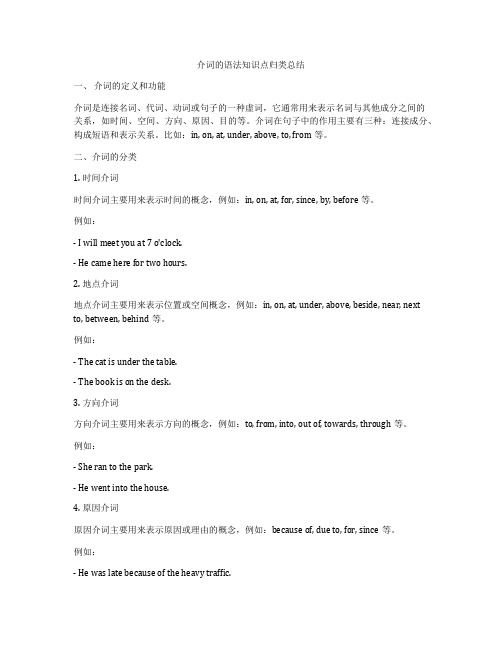
介词的语法知识点归类总结一、介词的定义和功能介词是连接名词、代词、动词或句子的一种虚词,它通常用来表示名词与其他成分之间的关系,如时间、空间、方向、原因、目的等。
介词在句子中的作用主要有三种:连接成分、构成短语和表示关系。
比如:in, on, at, under, above, to, from等。
二、介词的分类1. 时间介词时间介词主要用来表示时间的概念,例如:in, on, at, for, since, by, before等。
例如:- I will meet you at 7 o'clock.- He came here for two hours.2. 地点介词地点介词主要用来表示位置或空间概念,例如:in, on, at, under, above, beside, near, next to, between, behind等。
例如:- The cat is under the table.- The book is on the desk.3. 方向介词方向介词主要用来表示方向的概念,例如:to, from, into, out of, towards, through等。
例如:- She ran to the park.- He went into the house.4. 原因介词原因介词主要用来表示原因或理由的概念,例如:because of, due to, for, since等。
例如:- He was late because of the heavy traffic.目的介词主要用来表示目的或目标的概念,例如:for, to, in order to等。
例如:- I went to the supermarket for some food.6. 介词短语介词短语是由介词加上它的宾语构成,用来修饰名词或代词。
例如:in front of, in the middle of, in the end, on the way等。
初中英语介词的知识点总结
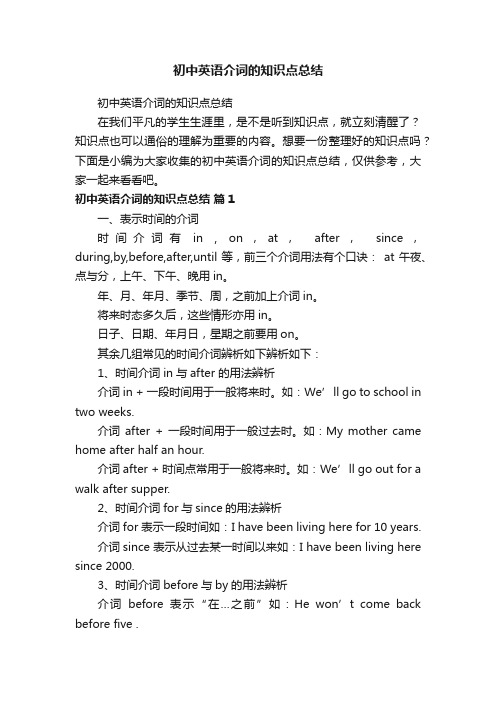
初中英语介词的知识点总结初中英语介词的知识点总结在我们平凡的学生生涯里,是不是听到知识点,就立刻清醒了?知识点也可以通俗的理解为重要的内容。
想要一份整理好的知识点吗?下面是小编为大家收集的初中英语介词的知识点总结,仅供参考,大家一起来看看吧。
初中英语介词的知识点总结篇1一、表示时间的介词时间介词有in , on,at,after,since,during,by,before,after,until等,前三个介词用法有个口诀:at午夜、点与分,上午、下午、晚用in。
年、月、年月、季节、周,之前加上介词in。
将来时态多久后,这些情形亦用in。
日子、日期、年月日,星期之前要用on。
其余几组常见的时间介词辨析如下辨析如下:1、时间介词in与after 的用法辨析介词 in + 一段时间用于一般将来时。
如:We’ll go to school in two weeks.介词after + 一段时间用于一般过去时。
如:My mother came home after half an hour.介词after + 时间点常用于一般将来时。
如:We’ll go out for a walk after supper.2、时间介词for与since的用法辨析介词for 表示一段时间如:I have been living here for 10 years.介词since 表示从过去某一时间以来如:I have been living here since 2000.3、时间介词before与by的用法辨析介词before表示“在…之前”如:He won’t come back before five .介词by表示“到…时为止,不迟于…”如:The work must be finished by Friday.4、时间介词during与for的用法辨析当所指的时间起止分明时用介词during如:He swims every day during the summer.如果一段时间不明确则用介词for如:I haven’t seen her for years.5、时间介词till与until用法的异同till和until用在肯定句中,均可表示“直到…为止”,如:I will wait till(until)seven o'clock.till和until用在否定句中,均可表示“在…以前”或“直到…才”。
中考英语专题复习之介词

中考英语专题复习之介词【知梳理】一、考介的用法[ 知接 ]分例in, at, on, between, since, for, during, until, till, by, from,表示to, by, before, pastin, at, on, around, before, in front of, between, behind,表示方向beside, near, under, above, below, ,next to, among表示来回的to, towards, round, around, though, across, from⋯to,方向into, out of, off, alongby, to, like, unlike, of, except, about, against, with, but,其余as, without(一)时间介词1.at、in 、on 表示的区(1)at 表示详细的点,常用于表示点及某些中。
如:at Christmas(在圣 );at six o ock(’cl在 6 点 );at night(在夜晚 );at the end of(在⋯⋯束 );at the age of(在⋯⋯);at last(最,最后 )。
(2)in 能够表示从在算起到若干此后,意“在⋯⋯后”,用于一般未来或去未来。
如:Can you finish drawing a good horse in five minutes?你能在 5 分内画一匹漂亮的?(3)on 用于表示确立的,详细某一天或详细某一天的上午、下午、夜晚或一般日等。
如:on December 1st,1994 (在 1994 年 12 月 1 日);on Teachers ’ Day在 (教 )on Monday morning (在礼拜一上午 );on a cold morning (在一个严寒的清晨 );on the night of October 22nd (在 10 月 22 日夜晚 );on Christmas Day (在圣 )。
初中英语语法介词知识点汇总

介词介词是一种虚词,不能独立充当句子成分,需与动词、形容词和名词搭配,才能在句子中充当成分。
介词是用于名词或代词之前,表示词与词之间关系的词类,介词常与动词、形容词和名词搭配表示不同意义。
介词短语中介词后接名词、代词或可以替代名词的词(如:动名词v-ing).介词后的代词永远为宾格形式。
一、表示时间的介词(一)表示时间段的介词(1)in , afterin +时间段,表示从现在起往后推算一段时间after +时间段,表示过去某时间往后推算一段时间,如:He’ll come back in two days. 但点钟用after( after three o’clock)He left on July 2 and returned after three days.(2)in , during表示在一段特指的时间内,可用in 或duringThe work was done in / during the holidays.表示年份、月份、季节用in , 如:in 1999 ,in June , in winter(3)in last, for the past + 时间段, during表示在最近一段时间内,句中谓语动词常用现在完成时I have been in Shanghai in the last few years.(4)for 表示延续一段时间。
I’ll study in the U.S for two yearsI’ve waited for Bingo for half an hour.(二)表示某一时间的介词(1)at, onat 表示某一时刻,on 表示某一天或日期, 如:at 7:14, on Saturday morning on the night of May2一天内各段时间表达, 选用正确的介词,请比较:in the morningon a winter / snow / cold / morningat nighton the night of March 7thin the eveningon Friday evening(2)before, bybefore 表示某一时间之前,而by 表示到某一时间止,句中谓语动词多用完成时态。
初中英语语法---介词专题(含练习)
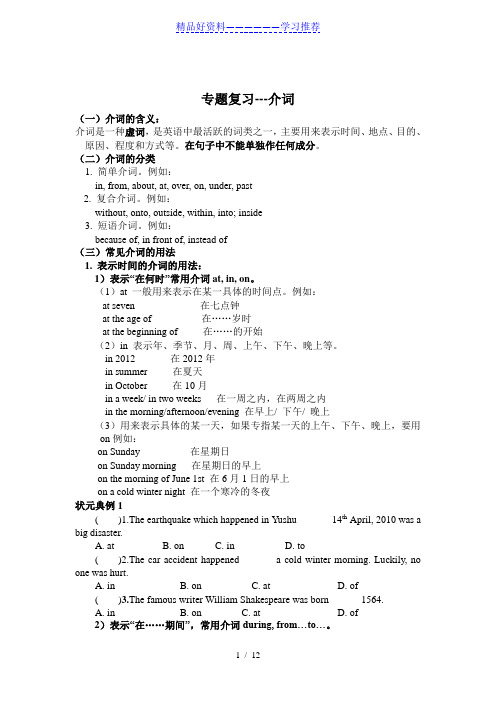
专题复习---介词(一)介词的含义:介词是一种虚词,是英语中最活跃的词类之一,主要用来表示时间、地点、目的、原因、程度和方式等。
在句子中不能单独作任何成分。
(二)介词的分类1. 简单介词。
例如:in, from, about, at, over, on, under, past2. 复合介词。
例如:without, onto, outside, within, into; inside3. 短语介词。
例如:because of, in front of, instead of(三)常见介词的用法1. 表示时间的介词的用法:1)表示“在何时”常用介词at, in, on。
(1)at 一般用来表示在某一具体的时间点。
例如:at seven 在七点钟at the age of 在……岁时at the beginning of 在……的开始(2)in 表示年、季节、月、周、上午、下午、晚上等。
in 2012 在2012年in summer 在夏天in October 在10月in a week/ in two weeks 在一周之内,在两周之内in the morning/afternoon/evening 在早上/ 下午/ 晚上(3)用来表示具体的某一天,如果专指某一天的上午、下午、晚上,要用on例如:on Sunday 在星期日on Sunday morning 在星期日的早上on the morning of June 1st 在6月1日的早上on a cold winter night 在一个寒冷的冬夜状元典例1( )1.The earthquake which happened in Yushu ______ 14th April, 2010 was a big disaster.A. atB. onC. inD. to( )2.The car accident happened ______ a cold winter morning. Luckily, no one was hurt.A. inB. onC. atD. of( )3.The famous writer William Shakespeare was born ______1564.A. inB. onC. atD. of2)表示“在……期间”,常用介词during, from…to…。
超全的初中英语介词知识点归纳总结,不看太可惜了!

超全的初中英语介词知识点归纳总结,不看太可惜了!【教学目标】1.熟练掌握常用介词的基本用法(表示时间、日期、地点、位置、方式等)。
例如:in,on,at,of,to,from,by,with,for,about,after,before等。
2.掌握上述介词的其他用法及所学其他介词的一般用法。
一、介词的定义:介词是一种虚词,用来表示名词或相当于名词的其他词语与句中其他词的关系,不能单独使用。
介词可以与名词或相当于名词的其他词构成介词短语。
on the desk在桌上 in Shanghai 在上海by accident 偶然的 on purpose 故意的drop out of school 辍学in front of school 在学校前二、介词的分类(一)简单介词。
例如: out,at,over,on,under,past,to(二)复合介词。
例如:without,onto,outside,within,into(三)短语介词。
例如: because of,in front of,instead of三、常见介词的用法(一).表示“在何时”常用介词at,on,in。
早午晚要用in , 年月季周in在前;将来时态in…以后。
in the morning(afternoon, evening)在早上(下午,晚上) in summer在夏天 in 2008在2008年 in May在5月 in five years 五年以后At :黎明午夜时与分,几岁之前用at;at dawn ,黎明,破晓at noon, 正午,中午at night; 在夜里at seven, 在七点钟 at eight thirty 在八点半 at half past ten.在十点半 at the age of ten 十岁的时候at the beginning of 在开始的时候。
on:日子、节日、年月日,星期加上早、午、晚,年、月、日加早、午、晚,of之前on代in.on Sunday在星期日on Children’s Day.在儿童节On August eighth, 2011. 在2011年八月八日on Sunday morning 在星期日的早上on the morning of June 1 在6月1日的早上on acold winter night 在一个寒冷的冬夜during在…期间from…to …从…到…during the summer holiday 在暑假 during the night 在晚上 from Monday to Friday 从周一到周五from 7 o’ clock to 9 o’ clock 从7点到9点Since 接点,for 接段,现在完成里面见。
- 1、下载文档前请自行甄别文档内容的完整性,平台不提供额外的编辑、内容补充、找答案等附加服务。
- 2、"仅部分预览"的文档,不可在线预览部分如存在完整性等问题,可反馈申请退款(可完整预览的文档不适用该条件!)。
- 3、如文档侵犯您的权益,请联系客服反馈,我们会尽快为您处理(人工客服工作时间:9:00-18:30)。
一、选择题1.He is__________ outgoing student long hair..A.a,with, B.an,with C.a,of D.an,of 2.—Why ______ you so busy these days?—Because they arrived ______ London ______ the morning of July1.A.are; in , in B.are; in , on C.do; on , in D.do; at , on 3.—What do you use the shelf ______?—I use it ______ books.A.to; to keep B.to; keepC.for; to keep D.for; keep4.The bird’s singing came into my room ______ the window and woke me up in the early morning.A.down B.from C.through D.across 5.(2016●泰州市) --As a nurse, her work goes taking care of her patients.--Yes, she always thinks of others.A.beyond B.beside C.behind D.between 6.Jiangsu Development Summit was open _____ May 20th in Nanjing.A.on B.in C.at D.by7.—When is your birthday party?—It's________.A.at six,on May 24th B.on six,this SaturdayC.in six o'clock this afternoon D.on six,at May 24th8.Lily often goes to visit her grandma ______ Sundays.A.at B.in C.on D.to9.It’s necessary for Tony to do ____ thing ____ his classmates do.A.same, as B.same, like C.the same, to D.the same, as10.______ Sunday morning my sister usually does her homework, and ______ the afternoon she usually plays tennis.A.On; on B.In; in C.On; in D.In; on 11.Taiwan is _________ the southeast of China.A.to B.in C.from D.on12.—I feel sad from time to time.Could you give me some advice?—________ sharing your worries with your parents?A.Why don't you B.How aboutC.Why not D.Would you like13.—When does your mother go shopping?—Usually Sunday morning.A.on B.in C.at D.after14.Don’t leave the room _____ the light on .A.in B.on C.about D.with15.We have four lessons ________ the morning.A.in B.on C.at D.for16.—How long have you lived in this town?—________2001.A.since B.in. C.for17.My teacher runs ______ the morning. But he doesn't run ______ Sunday morning. A.in;on B.on;in C.in;in D.on;on 18.—What is Linda doing?—She is talking ________ the phone with her friend ________ a movie.A.in; for B.on; on C.about; on D.on; about 19.My daughter usually gets up at 6:00 ________ the morning, but ________ Sunday morning she gets up at 8:00.A.in; in B.in; on C.on; in D.on; on20.This pair of jeans looks nice _____ Sandy, because she looks very nice _____ blue. A.on; in B.in; on C.for; on D.to; in21.---Do you prefer coffee _____milk in it?---Sometimes, but most of the time I ______drink black coffee.A.or, would rather B.with, prefer C.with, would rather D.to, prefer 22.Tom and Black clothes store is ______a great sale. It has nice shirts _______all colors. A.at; in B.on; at C.of; in23.After working her way around the world, Annie ended up English as a foreign language. A.teach B.taughtC.teaching D.to teach24.—Where is Hubei?—It’s _______ the north of Hunan.A.in B.to C.on25.The Qingming Festival of this year falls _____ April 5th and thousands of cars poured into high-ways _____ the early morning of the holiday.A.on; in B.in; on C.on; on D.in; in【参考答案】***试卷处理标记,请不要删除一、选择题1.B解析:B【分析】【详解】句意:他是一位留着长发的外向的学生。
Outgoing第一个因素是原因,所以用an; with结构作定语。
所以选B。
2.B解析:B【解析】【详解】句意:——你(们)这些天为什么这么忙?——因为他们在7月1日的早上到达了伦敦。
考查be动词和介词辨析。
根据问句中busy是形容词,主语是they,所以此处应使用be动词are,构成系表结构are busy;第二句中London表示“大地点”,所以此处使用arrive in London;第二句中the morning of July1表示“7月1日的早上”,属于具体某一天的早上,所以前面使用介词on。
故选B。
【点睛】时间介词in可以用在早、中、晚的前面,例如:in the morning/afternoon/evening;但是如果是在具体某一天的早、中、晚的前面,则要使用介词on,本题中the morning of July 1表示具体一天的早上,所以介词使用on。
3.C解析:C【解析】【详解】句意:——你使用那个架子干什么?——我用它来保存书籍。
考查介词用法和不定式作宾语补足语。
to表示目的或意图;keep保存;for为了。
分析句子结构可知要用介词for与疑问句what搭配表示“为了什么”,to后需接动词原形构成不定式,不符合题意;use sth. to do sth.用某物来做某事,第二空用动词不定式表目的。
故选C。
4.C解析:C【解析】【详解】句意:鸟儿的歌声透过窗户进入我的房间,一大早就把我吵醒了。
本题可用“语境分析法”解答。
down“沿着;向下”;from“来自”;through“(从物体内部或空间)穿过”;across“(从物体表面)穿过”。
由句意“鸟的歌声从窗户传进我的房间……”可知选C。
5.A解析:A【解析】【分析】句意:——作为护士,她的工作超出了照顾病人的范畴。
——是的,她总是为其他人考虑。
beyond超过;beside旁边;behind在……后面;between两者之间。
根据句意可知,表示“超出了……的范畴”。
故选A。
6.A解析:A【解析】句意:江苏发展峰会于5月20日在南京开幕。
考查介词辨析题。
表示时间的某一点、某一时刻或年龄等用 at;泛指一般意义的上午、下午或晚上以及月或年等较长的时间,一般用 in;若表示星期几或某一特定的日期,则用 on;表示“到……时为止”或“不迟于……”用by。
本句May 20th是特定日期,需用on。
根据句意语境,可知选A。
点睛:时间介词是英语中的经典考题。
表示时间的介词很多:一、at, on, in (A) at表示“在某一时刻,某一时点”;(B) on表示“在具体某一天或某天的上、下午”;(C) in表示“在某世纪、年、季度、月、周”以及泛指的上、下午、晚上。
二、for, during, through (A) for后接“一段时间”,表示某事持续多久,后接时间段,多与完成时连用;(B) during表示“在……期间”;(C) through表示“一直……,自始至终”。
三、from, since (A) from表示“时间的起点”,可译作“从……”,多用于“from…to/till…”中;(B) since表示“自从……以来(直到现在)”,后接时间点。
四、before, by, till, until (A) before指“在……之前”,与after相对;(B) by指“不迟于,到……时为止,在……以前”;(C) till (until) “直到……为止”。
五、after, in, within(A) after表示“在……之后”,是before的反义词;(B) within“在……时间之内”。
